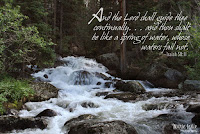The concept of a new life through water is a very old one in Scripture; during the Exodus when Moses was setting up the Tabernacle as a place of worship, the priests were required to wash with water before they approached the altar, and when the Levites were assigned their duties they washed, and an atonement for sin was made for them.(1) At the beginning of the message of the prophet Isaiah to God's people includes the instruction to "Wash yourselves, make yourselves clean; put away the evil from your deeds, from before My eyes. Cease to do evil...though your sins are as scarlet, they wht be as white as snow."(2) King David's response when he confronted with his sin, is a prayer to God: "Wash me thoroughly from my iniquity, and cleanse me from by sin. ..wash me, and I will be whiter than snow."(3)
The relationship between forgiveness and a new life through water comes out in Jesus' words: When Jesus told Nicodemus that "you must be born again", He also told him, "No one can enter the Kingdom of God unless he is born of water and the Spirit."(4) John the Baptist's explanation of what he was doing: "The reason I came baptizing with water is that He [Jesus] might be revealed to Israel."(5) Jesus told the woman at the well in Samaria that "The water that I give him will become in him a spring of water welling up to eternal life." (6)
I see the image of a spring of water bringing new life not only as the rebirth of baptism, but also being a continuous image of life in the Kingdom. A spring of water is a continuous thing; it not only continues to bubble up water but the water flows out to an everwidening area. Baptism--a literal experience of death and rebirth through water--should make us noticeably different people. People came to Jesus because they saw a different sort of person than they were used to seeing--especially in contrast to the religious authorities who worried more about their position and politics than about God, and who thought any Messiah should have checked in with them first. It is interesting that what Jesus told people to tell about, and what people did tell about on their own, were more likely to be stories of what He did, rather than what He said. Yes, what He said is important--but what He said grew out of what the prophets and followers of God--and God Himself!--had said for two thousand years. What He did was unprecedented and irrepeatable--and changed history.
1. Numbers 8:21 2.Isaiah 1:16,18 3. Psalm 51: 2, 7 4. John 3:5 5. John 1:31 6. John 4:14

No comments:
Post a Comment